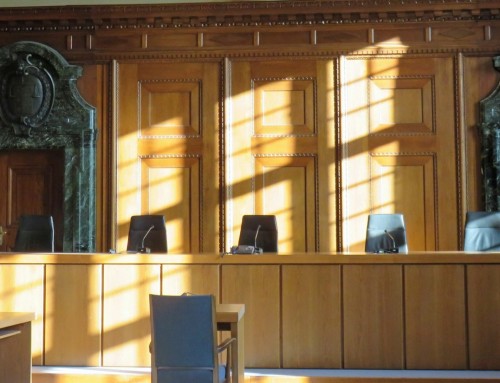Key Differences Between an Evidentiary Hearing and a Trial in Family Law
You are probably familiar with the phrase “custody battle.” It’s unfortunate to see how many parents struggle to reach a resolution in family law disputes, but contested divorces can involve many other factors besides children.
This is where hearings and trials come in. According to a Salt Lake County report, 53 percent of all family law cases involve at least one prior evidentiary hearing before reaching a final resolution.
Many parents are confused about the rules and what to expect when they are scheduled for evidentiary hearings or trials. If you are about to pursue a family law case, it’s crucial to understand the difference between the two.
1. The Purpose and Scope of Each Proceeding
An evidentiary hearing is like a mini-trial. This is where the judge will listen to witnesses testify and review the evidence presented for one part of your divorce case.
These hearings often address time-sensitive matters like:
- Temporary child custody arrangements
- Child support
- Temporary alimony
On the other hand, a trial is where a permanent resolution is made. This is when the judge considers all testimonies and physical evidence to make a final decision on every issue in your divorce case.
Common issues addressed in evidentiary hearings
Evidentiary hearings typically handle pressing matters that can’t wait for a full trial. For instance, when a couple separates, they soon need to decide where the children will live.
Time-sensitive issues like these can have quite an impact on your children. Fortunately, the court recognizes that divorce cases involving children should be addressed quickly and with care.
Some common issues addressed in the hearing include:
- Temporary parent-time schedules
- Interim child support calculations for temporary financial support
- Temporary alimony to a spouse until a final decision is made
- Immediate decision about who can live in the family home or use shared assets during the divorce process
- Temporary restraining orders to protect one party from potential harm or harassment
- Enrollment decisions on which school children will attend until a final order is issued
Common issues addressed in a full trial
The final trial is where permanent court orders are given to set all divorce matters straight.
Family law trials address long-term issues such as:
- Final custody arrangements and parenting plans
- Permanent child support orders
- Property and debt division of marital assets and liabilities
- Permanent alimony awards
- Retirement account division
2. The Duration and Scheduling Differences
Hearings can last anywhere from 1 hour to a couple of hours. In Utah, these hearings last from half a day to one full day. The court usually schedules these hearings within 14 days of the request. However, this may vary depending on the urgency of the case.
Trials, on the other hand, demand a lot more court time. These proceedings can go on for quite a few days. As mentioned before, the decisions made at the final trial are permanent. For this reason, a final trial may be scheduled within several weeks of the filing date.
The long wait period for trials accommodates the court’s calendar. It’s beneficial because it allows both parties enough preparation time. This long time can also be valuable to your family law attorney.
Your family law attorney will use this extra time to:
- Gather evidence
- Prepare witnesses
- Develop a strong defense
3. Burden of Proof Differences
The amount of proof required differs between an evidentiary hearing and a trial in family law divorce cases. During hearings, the parties involved need to show “good cause” for temporary relief. This lower standard reflects the temporary nature of these orders and the judge’s need for quick decisions.
Trial proceedings demand a higher burden of proof. The involved parties must prove their cases by a move called “preponderance of the evidence.” This means your evidence must prove the truth of your version of events over your soon-to-be ex.
4. Court Etiquette and Behavioral Expectations
The way you are expected to conduct yourself during each proceeding differs slightly. During an evidentiary hearing, you must maintain formal court standards while allowing slightly more relaxed interaction.
You should follow these rules of conduct:
- Business casual attire may be acceptable
- Direct answers to the judge’s questions encouraged
- Limited interaction with the opposing party permitted
- Brief sidebars between attorneys common
- More flexible seating arrangements are possible
Trials, however, have stricter court rules and hearing procedures:
- Professional business attire required
- Communication permitted only through attorneys
- Direct interaction with the other party prohibited
- Formal seating arrangements
- Rules about entering or leaving the courtroom
- Professional conduct maintained during breaks
5. Evidence Presentation Methods
The way evidence is presented in court differs between these two proceedings.
In an evidentiary hearing, the court often allows:
- Simplified submission of relevant financial records
- Testimony from the main parties involved
- Basic evidence like texts or emails
- Written witness statements to support your position
- Simplified handling of evidence to expedite proceedings
Trials, however, require more formal and in-depth evidence presentation.
In addition to a thorough cross-examination of evidence, the court will consider:
- Expert witness testimony to clarify complex issues
- Formal exhibits, properly marked and authenticated to ensure that all evidence meets legal standards
- Direct questioning of witnesses to establish facts
- Detailed financial records and documentation to support claims
- Professional reports and analysis of issues at hand
6. Emotional Preparation and Support
As a parent going through a custody battle, your emotional well-being should not be neglected. A court hearing can be stressful, but the good part is you get to focus on one part of your divorce.
This limited scope can make hearings emotionally easier to handle, but you should still:
- Review all relevant documents beforehand. Being prepared can help you feel more confident.
- Practice answering questions about specific issues. Familiarity with your case can ease your anxiety.
- Prepare to see your former partner. Emotional readiness is key to navigating the situation calmly.
- Arrange for childcare if needed. Ensure your children are cared for during the hearing.
- Plan for time off work. Make necessary arrangements to minimize stress on the day of the hearing.
Trials, on the other hand, require more extensive emotional preparation. You will need to be ready to face every aspect of your divorce case.
Consider planning extended time away from work. Make sure your responsibilities are managed while you’re in court. You should also try building a support network for the trial period. Friends and family can be a great source of emotional help.
7. Impact on Children and Family Relationships
An evidentiary hearing often creates less disruption to family routines. Trials can also significantly impact family dynamics and require more extensive planning.
However, you should still:
- Maintain consistent communication with your children
- Keep their daily routines as normal as possible
- Avoid discussing case details with them
- Arrange for trusted caregivers during the hearings or for long-term care if necessary
- Plan for potential schedule adjustments
- Prepare children for extended schedule changes
- Consider counseling support for affected family members
- Maintain stability in school and activities
- Create a support network for emotional assistance
8. Post-Hearing/Trial Procedures
After an evidentiary hearing, you can expect quick results. The judge usually decides within a few days and issues written temporary orders. These orders will include clear instructions on what to do next. Remember, if your situation changes significantly, you can ask the court to modify these temporary arrangements.
After a full trial, you’ll need to wait for the judge’s final decision, which could take several weeks. During this time, your lawyer will review the written findings and file objections if needed. Your lawyer might also file post-trial motions to address any remaining issues.
Once everything is finalized, you’ll need to follow the court’s orders exactly. If you disagree with the outcome, you and your lawyer can discuss whether an appeal might be right for your case.
9. Financial Costs to Plan For
When preparing for a court hearing, you have to think of finances. Hearing costs are more manageable since family law hearings are shorter and more focused than trials.
Some of these costs include:
- Attorney fees
- Filing fees for temporary orders
- Limited witness fees, if any
- Basic document preparation costs
- Minimal court reporter fees
Trial expenses typically include more significant costs.
Since trials are more complex and can last several days or longer, you’ll need to budget carefully for these additional expenses:
- Extended attorney preparation (longer than hearing prep time)
- Expert witness fees
- Court reporter fees for multiple days
- Exhibit preparation and presentation costs
- Potential travel expenses for witnesses
- Technology fees for evidence presentation
Planning for these expenses helps reduce stress during the legal process. Many law firms offer payment plans or require separate retainers for trial preparation.
Making the Most of Either Proceeding
Success in court hearings and trials depends on thorough preparation and professional presentation. Working closely with your attorney ensures the best possible outcome.
Always be sure to:
- Provide all requested documentation promptly
- Maintain detailed records of relevant events
- Follow your attorney’s guidance
Both proceedings serve important purposes in family law cases. An evidentiary hearing provides the necessary structure and temporary solutions while your child custody case progresses. Trials offer the opportunity for permanent resolution of all issues affecting your family’s future.
Options for Alternative Dispute Resolution
Before either party has a hearing or trial, the court may propose alternative dispute resolution (ADR). These methods can save you time, money, and emotional strain.
For issues addressed in an evidentiary hearing, ADR options include:
- Emergency mediation sessions
- Temporary agreement negotiations
- Parenting coordinator interventions
- Short-term arbitration
Trial-level issues require more comprehensive ADR approaches, such as:
- Multiple mediation sessions
- Early neutral evaluation
- Collaborative law processes
- Judicial settlement conferences
Success rates for ADR vary significantly between temporary and permanent issues, with temporary matters often reaching resolution more quickly because of the simpler structure.
How a Lawyer Can Help You Prepare
For an evidentiary hearing, where you present evidence and witnesses to the judge, you’ll want to focus on what’s most urgent. Here are some things your family law attorney can help you with:
- Identifying key documents for temporary orders
- Preparing clear testimony to help the judge understand your position
- Developing arguments for temporary relief
- Considering how temporary orders might affect the final trial strategy
A trial strategy requires more detailed planning, with which your attorney can help by:
- Developing and outlining your story to present a cohesive argument
- Coordinating multiple witnesses to ensure everyone is prepared and knows their role
- Organizing evidence to maximize its impact
- Preparing for opposing counsel’s strategy
- Examining settlement possibilities throughout the process
Brown Family Law Can Help You Better Understand the Process
Family court involves complex legal steps alongside personal challenges. Whether you are facing a hearing or preparing for trial, having a skilled attorney makes all the difference. We at Brown Family Law are committed to getting the best results for your family.
Since 2010, we have guided thousands of families through their toughest moments. This means that, when you sit down with us, you’re working with lawyers who have helped people in your exact position and know how to protect you and your children.
We help with custody arrangements, co-parenting challenges, and more. Contact Brown Family Law today – we’re here to be your advocates. Call us at 801-685-9999 or complete the contact form to schedule a free case evaluation.
Photo by Wesley Tingey on Unsplash










